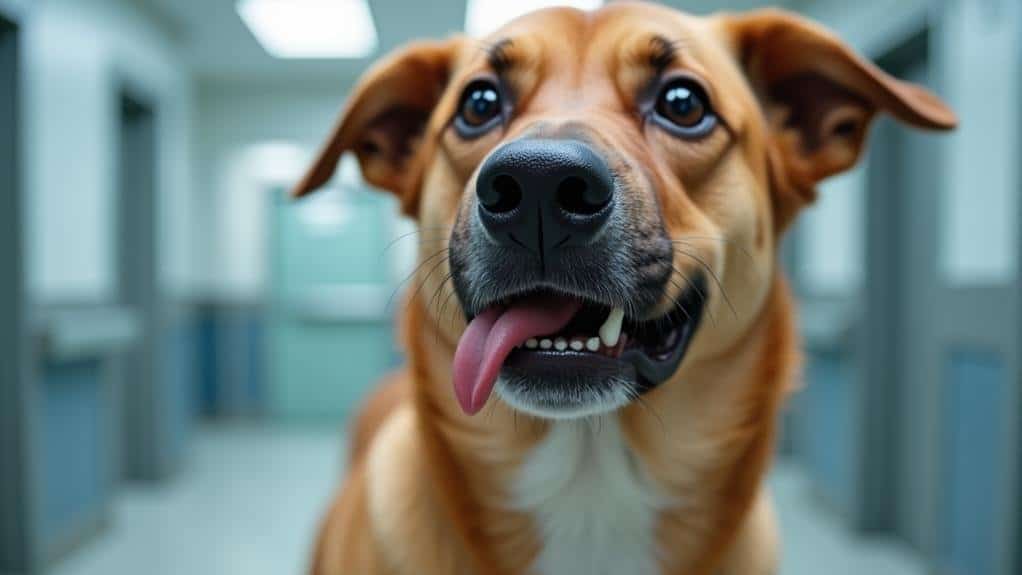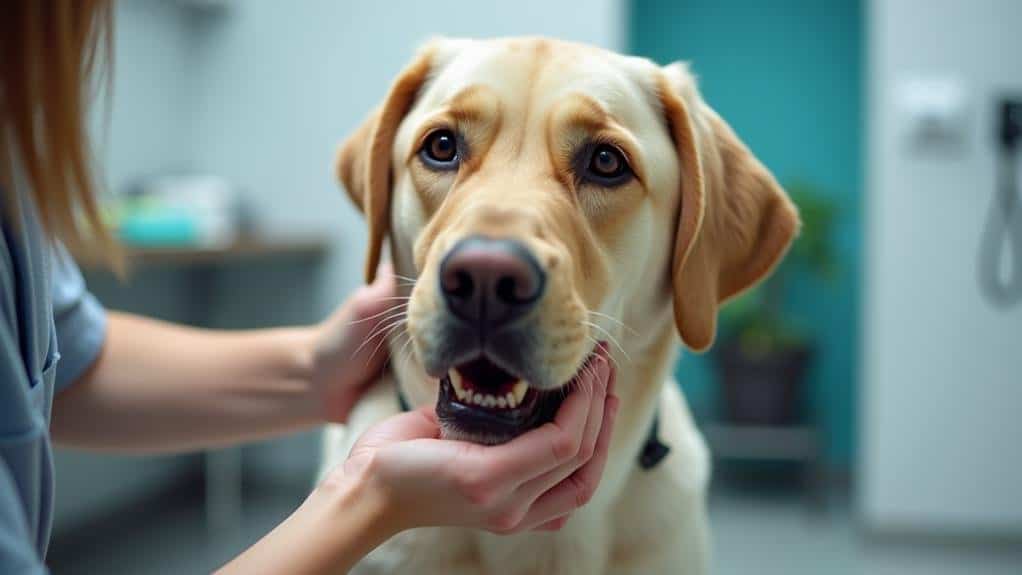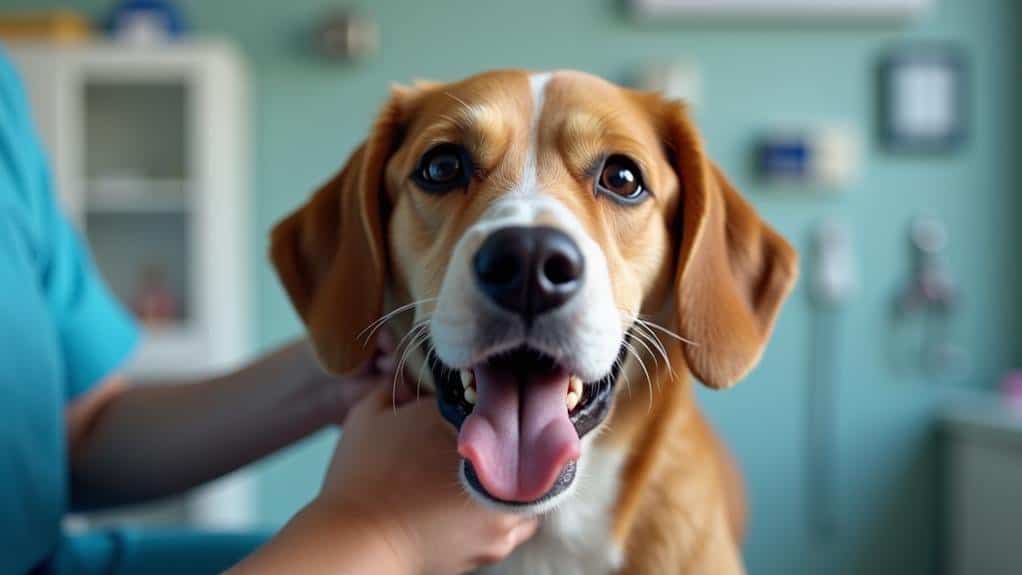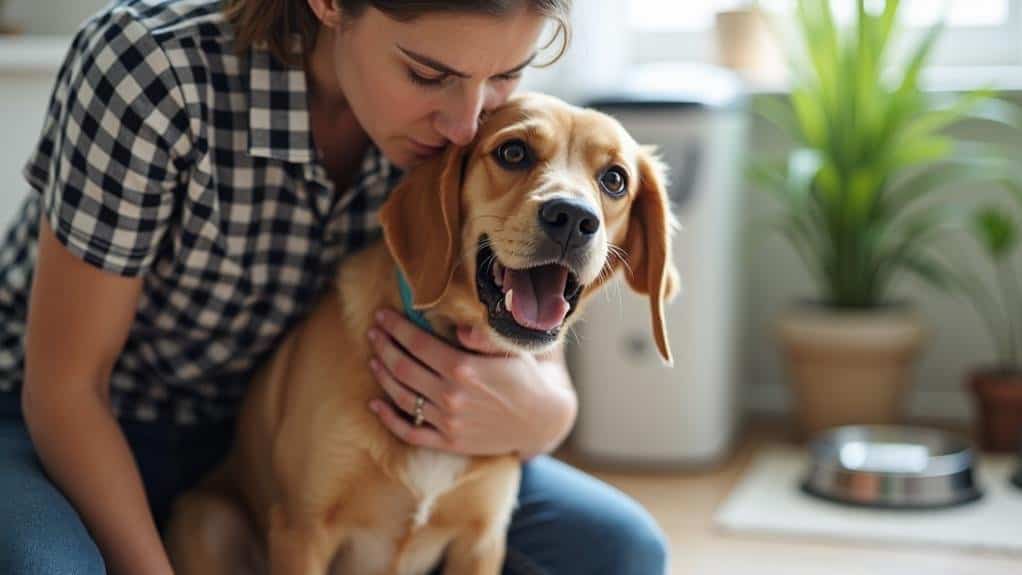Your dog's gagging without vomiting could stem from several issues. Common causes include foreign objects in the throat, respiratory infections like kennel cough, or gastrointestinal problems such as reflux. Allergies and serious conditions like bloat can also trigger gagging. It's essential to distinguish gagging from vomiting, as gagging occurs higher in the throat and typically doesn't expel stomach contents. If gagging persists for more than 48-72 hours or is accompanied by other symptoms like difficulty breathing or lethargy, seek veterinary care promptly. Understanding the potential causes and warning signs can help you better address your dog's health concerns.
Common Causes of Dog Gagging

A dog's gag reflex can be triggered by various factors, ranging from minor irritations to serious health issues. One common cause of gagging in dogs is the presence of foreign objects lodged in the throat. These can obstruct the airway and stimulate the gag reflex without causing vomiting. If you suspect your dog has swallowed something it shouldn't have, it's essential to seek veterinary attention immediately.
Respiratory infections, such as kennel cough, often lead to gagging due to throat and airway irritation. You might notice your dog making coughing and retching sounds as a result.
Gastrointestinal issues like reflux or gastritis can also cause throat irritation, leading to gagging without vomiting. Additionally, allergies can trigger inflammation in the throat, causing your dog to gag as it tries to clear the irritant.
A more serious condition to be aware of is bloat, or gastric dilatation-volvulus (GDV). This potentially life-threatening issue can cause gagging along with an enlarged abdomen and restlessness.
If you notice these symptoms, it's essential to seek immediate veterinary care. Understanding these common causes can help you better assess your dog's health and determine when professional help is needed.
Distinguishing Gagging From Vomiting

While recognizing common causes of gagging is important, it's equally essential to differentiate between gagging and vomiting in dogs. Gagging occurs higher in the throat and often produces sounds similar to retching, but doesn't result in the expulsion of stomach contents. You might notice your dog dry heaving or producing small amounts of saliva or white froth during a gagging episode.
Vomiting, on the other hand, involves coordinated contractions that expel food or liquid from the stomach. The gag reflex is a protective mechanism triggered by various stimuli, such as a foreign object in the throat or respiratory infections. It's designed to prevent choking, while vomiting serves to eliminate harmful substances from the stomach.
Distinguishing between these two actions is vital for an accurate diagnosis of underlying conditions. Persistent gagging may indicate issues like kennel cough or a foreign object obstruction, while vomiting often suggests digestive problems or toxicity.
When to Seek Veterinary Care

Most dog owners will encounter gagging in their pets at some point, but knowing when to seek veterinary care is vital. If your dog's gagging persists for more than 48-72 hours, it's important to consult a veterinarian as it may indicate a serious medical issue.
Don't wait to seek help if you notice signs of distress, such as difficulty breathing, excessive drooling, or pawing at the mouth. These symptoms could signal a respiratory problem or foreign body obstruction requiring immediate veterinary attention.
Watch for gagging accompanied by coughing, lethargy, or changes in appetite, as these may point to infections or gastrointestinal issues that need professional assessment.
If your dog shows sudden gagging after eating or playing, especially with a history of ingesting foreign objects, don't hesitate to seek veterinary care. This could indicate a blockage that requires prompt intervention.
Regularly monitor your dog's behavior and symptom progression to identify potential problems early. By staying vigilant and seeking appropriate treatment when necessary, you'll guarantee your dog receives timely care for any underlying conditions causing the gagging.
Diagnosing Gagging in Dogs

Once you've decided to seek veterinary care for your dog's gagging, the diagnostic process begins. Your vet will start with a thorough examination, including a review of your dog's medical history and an assessment of the gagging episodes.
It's helpful if you can provide video documentation of these incidents, as this can offer valuable insights into the timing and triggers of your dog's symptoms.
During the physical examination, your vet may recommend various diagnostic tests to identify underlying causes. These may include:
- Blood work to detect infections or other health issues
- X-rays or endoscopy to check for foreign objects or blockages
- Observation of gagging in relation to eating or play
These diagnostic imaging techniques can reveal anatomical abnormalities or obstructions in your dog's throat or esophagus.
The timing of gagging episodes can provide critical clues about potential triggers or underlying conditions.
Prevention and Management Strategies

To prevent and manage gagging in dogs, you'll need a combination of proactive measures and lifestyle adjustments.
Start by scheduling regular veterinary check-ups to identify and address potential health issues early. These visits can help reduce the risk of gagging and other related symptoms.
Adjust your dog's feeding habits by offering smaller, more frequent meals throughout the day. This approach can prevent overeating and minimize gastrointestinal issues that may lead to gagging.
Consider using slow-feed bowls or food dispensers to control your dog's eating pace, lowering the chance of gagging due to rapid consumption.
Keep foreign objects and potential choking hazards out of your dog's reach. This simple step is vital for preventing gagging incidents caused by ingestion of small items.
Educate yourself about the signs of serious conditions, such as bloat or respiratory infections, so you can respond promptly if your dog begins to gag frequently.
Frequently Asked Questions
Why Does My Dog Keep Gagging Like He's Going to Throw up but Doesn't?
Your dog's gagging without vomiting could be due to throat irritation, respiratory infections, or gastrointestinal issues. It's not always a sign of impending vomiting. If it persists or you're concerned, consult your vet for a proper diagnosis.
When Should I Be Concerned About My Dog Gagging?
You should be concerned if your dog's gagging persists for over 48-72 hours. If it's accompanied by distress, breathing difficulties, or excessive drooling, seek immediate veterinary care. Also, be alert to sudden onset gagging, especially after eating or playing.
Why Does My Dog Keep Gagging Like Something Is Stuck in Her Throat?
Your dog's gagging could be due to several reasons: a foreign object lodged in her throat, respiratory infections like kennel cough, or throat irritation. If she's a brachycephalic breed, it might be related to her anatomy. Persistent gagging warrants a vet visit.
What to Do if Your Dog Keeps Trying to Throw up but Can T?
If your dog's struggling to throw up, don't wait. Take them to the vet immediately. It could be an obstruction or serious condition. Don't try home remedies. Record any gagging episodes to show the vet. Act fast to prevent complications.
Conclusion
You've learned about the various reasons your dog might gag without vomiting, from minor irritations to more serious conditions. Remember, it's essential to monitor your pup's behavior and seek veterinary care if the gagging persists or worsens. By staying vigilant and addressing potential causes, you'll help keep your furry friend healthy and comfortable. Don't hesitate to consult your vet if you're unsure – they're your best resource for your dog's well-being.

